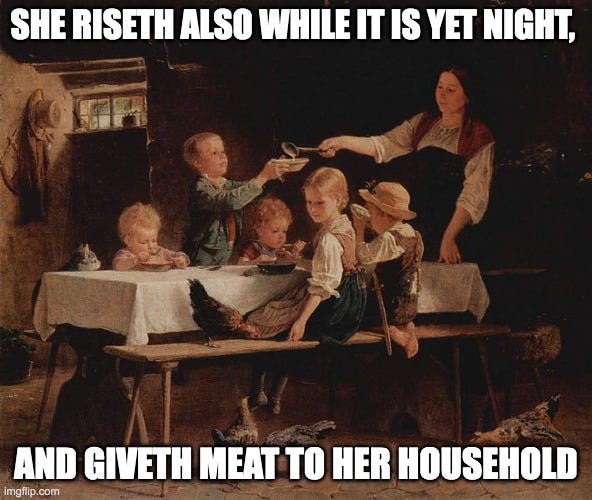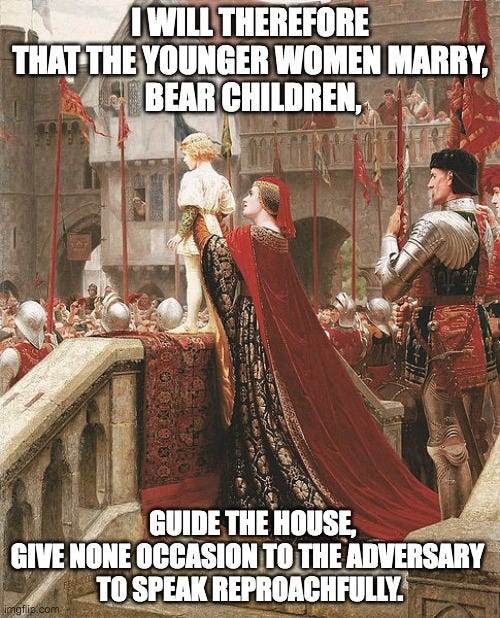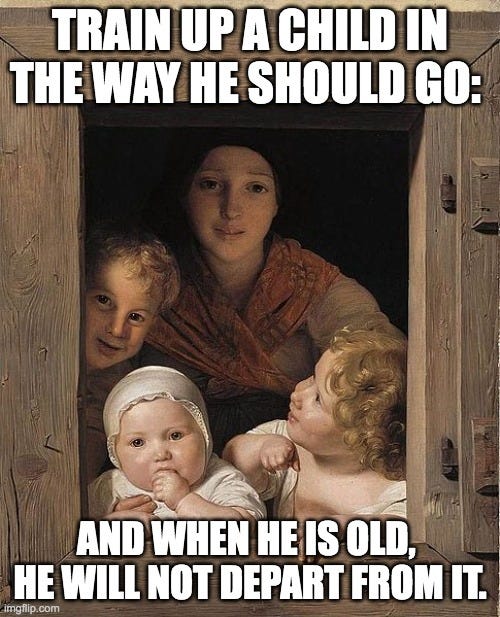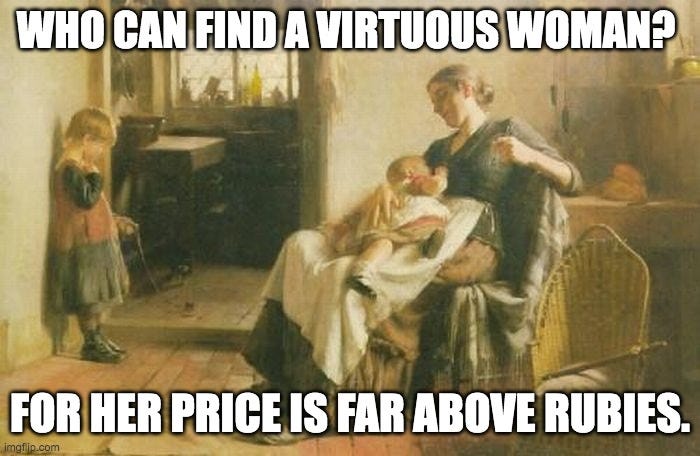Gender Roles
I read a statement… which I have since lost… where the poster, a radical feminist, stated,
“When I get to heaven, I am going to be judged as an individual, not by how well I fulfilled my gender roles.”
This is an example of something called a ‘false dichotomy’. There is nothing at all contradictory about being ‘judged as an individual’ and being ‘judged by how well I fulfilled my gender roles’.
Being judged ‘as an individual’ means not being judged by how well other people, to which group you happen to belong, do. So, for example, if you are part of a ‘group project’ at school, once the assignment is turned in, your individual grade depends on the entirety of the project: which includes both your work and that of others. You are graded ‘collectively’. Not ‘individually’.
Now let’s look at the idea of roles in the same context: a group project. Except now the teacher has chosen, or you have chosen, among various different roles for the project. One of you is chosen to interview the subjects, one to do mathematical analysis on the data, one to write up the data with footnotes and all, and one to give the presentation to the class. And now you can be graded… individually. But note that the individual grades are according to ‘how well you fulfilled your project role’. You might be a great presenter, but if your role was to do the mathematical analysis… it is upon the mathematical analysis that you will be judged.
So it is simply false that being ‘judged individually’ and being judged ‘according to your gender roles’ are contradictory. God has seen fit to give each of us various roles… and we have chosen others as we have gone along life… and if we are going to be ‘judged individually’ it will be precisely according to those roles. One might be a man, husband, father, carpenter, deacon, treasurer of the chess club… and God and all of us will judge him on his husband-ness, father-ness, carptenter-ness, deacon-ness, and honesty and accuracy of the chess club books. That is precisely what it means to be judged ‘as an individual’.
Gird up now thy loins like a man; for I will demand of thee, and answer thou me.
And Scripture is filled with such examples. Take the parable of the talents. The man given the ten talents was judge by what he did… with the ten talents. Or take Joseph: he had a role which involved taking care of everything in Potiphar’s household… but did NOT involve sleeping with his wife.
We will be judged, before God, as individuals. We may also be judged as part of groups (Scripture is filled with such examples). But when we are judged as individuals one very important aspect of how we will so be judged is… how well we fulfilled all of the roles that God gave us, that our society gave us, and that we took on ourselves.
Gender Roles
That doesn’t finish our discussion. Should our women be judged on how well they ‘fufill their gender roles’? Which follows from the questions ‘Are there gender roles?’ and ‘Does God wish us to follow them?’. The answer to which are ‘yes there are’ and ‘yes he does’. From the beginning of history God has made it clear that ‘gender roles’ exist, and that He expects us to follow them.
Men and women are, in some ways, mirror images of each other when it comes to roles. But since the question here concerns women, let us look at what both Scripture and the mass of mankind have considered the essential female roles. Too often we focus on minor issues specific to our culture, such as who drives. But I am going to point us to things much more fundamental than that:
Bear Children
Barring a technical advance, and ignoring the modern nonsense of calling a woman a man, only women can get pregnant. Aside from the one well documented virgin birth, and the two people created directly in the beginning, pretty much all of the rest of us have come about when a man has sex with a woman, his sperm travels up to her fallopian tubes, meets an egg, they go out for a couple of dates and, bang, a child is born.
Well, no. No dates, and not born. A child is concieved. And, being concieved, it hangs around for the next nine months or so… inside of her mother.
Nurse Children
For most of history a child who had no mother to nurse him would die. It was very difficult to try to keep a child alive with other food. So when their own mother would die a substitute mother would be engaged: a wet nurse.
But for most of history it was very clear: an infant needed a mother to nurse him.
Raise Children
The final fact which fixes this is a sufficiently plain one. Supposing it to be conceded that humanity has acted at least not unnaturally in dividing itself into two halves, respectively typifying the ideals of special talent and of general sanity (since they are genuinely difficult to combine completely in one mind), it is not difficult to see why the line of cleavage has followed the line of sex, or why the female became the emblem of the universal and the male of the special and superior. Two gigantic facts of nature fixed it thus: first, that the woman who frequently fulfilled her functions literally could not be specially prominent in experiment and adventure; and second, that the same natural operation surrounded her with very young children, who require to be taught not so much anything as everything. Babies need not to be taught a trade, but to be introduced to a world. To put the matter shortly, woman is generally shut up in a house with a human being at the time when he asks all the questions that there are, and some that there aren’t. It would be odd if she retained any of the narrowness of a specialist. Now if anyone says that this duty of general enlightenment (even when freed from modern rules and hours, and exercised more spontaneously by a more protected person) is in itself too exacting and oppressive, I can understand the view. I can only answer that our race has thought it worth while to cast this burden on women in order to keep common-sense in the world. But when people begin to talk about this domestic duty as not merely difficult but trivial and dreary, I simply give up the question. For I cannot with the utmost energy of imagination conceive what they mean. When domesticity, for instance, is called drudgery, all the difficulty arises from a double meaning in the word. If drudgery only means dreadfully hard work, I admit the woman drudges in the home, as a man might drudge at the Cathedral of Amiens or drudge behind a gun at Trafalgar. But if it means that the hard work is more heavy because it is trifling, colorless and of small import to the soul, then as I say, I give it up; I do not know what the words mean. To be Queen Elizabeth within a definite area, deciding sales, banquets, labors and holidays; to be Whiteley within a certain area, providing toys, boots, sheets, cakes and books, to be Aristotle within a certain area, teaching morals, manners, theology, and hygiene; I can understand how this might exhaust the mind, but I cannot imagine how it could narrow it. How can it be a large career to tell other people’s children about the Rule of Three, and a small career to tell one’s own children about the universe? How can it be broad to be the same thing to everyone, and narrow to be everything to someone? No; a woman’s function is laborious, but because it is gigantic, not because it is minute. I will pity Mrs. Jones for the hugeness of her task; I will never pity her for its smallness.
Now here is where we take the tiniest step away from biology. After a mother is done bearing the child, and nursing the child, it begins to be true that someone else can, biologically speaking, raise the child.
But not well. Science has shown that the best atmosphere for a child to be raised in is by their biological mother and biological father. It’s not perfect, and all too often it is the biological mother who has the child killed before she can even get to the point of being raised, but it is, overall, best.
And when we turn to the Scriptures, it is commanded.
Helpmeet
Now we come to the first and most offensive of the gender roles. The woman was created for the man, to be his helpmeet. Together they are called to take dominion of the world. Together, the man, and the woman as h is helpmeet.
And the LORD God said, It is not good that the man should be alone; I will make him an help meet for him.
Who can find a virtuous woman? for her price isfar above rubies. The heart of her husband doth safely trust in her, so that he shall have no need of spoil. She will do him good and not evil all the days of her life.
She seeketh wool, and flax, and worketh willingly with her hands. She is like the merchants' ships; she bringeth her food from afar. She riseth also while it is yet night, and giveth meat to her household, and a portion to her maidens. She considereth a field, and buyeth it: with the fruit of her hands she planteth a vineyard.
She girdeth her loins with strength, and strengtheneth her arms. She perceiveth that her merchandise is good: her candle goeth not out by night. She layeth her hands to the spindle, and her hands hold the distaff. She stretcheth out her hand to the poor; yea, she reacheth forth her hands to the needy. She is not afraid of the snow for her household: for all her household are clothed with scarlet. She maketh herself coverings of tapestry; her clothing is silk and purple.
Her husband is known in the gates, when he sitteth among the elders of the land.
She maketh fine linen, and selleth it; and delivereth girdles unto the merchant. Strength and honour are her clothing; and she shall rejoice in time to come. She openeth her mouth with wisdom; and in her tongue is the law of kindness. She looketh well to the ways of her household, and eateth not the bread of idleness.
Her children arise up, and call her blessed; her husband also, and he praiseth her.
Many daughters have done virtuously, but thou excellest them all. Favour is deceitful, and beauty is vain: but a woman that feareth the LORD, she shall be praised. Give her of the fruit of her hands; and let her own works praise her in the gates.
Proverbs 31: 10-31
Conclusion
Our modern society, and our modern women, have rejected gender roles. Indeed, they have rejected biology. Our women, in the church and out of the church. no long wish to have children, nurse children, or train children… and they rejected being a man’s helpmeet utterly. As a result our society will die.
Unless we regain our sanity, that is.
Thank you for reading Von’s Substack. I would love it if you commented! I love hearing from readers, especially critical comments. I would love to start more letter exchanges, so if there’s a subject you’re interested in, get writing and tag me!
Being ‘restacked’ and mentioned in ‘notes’ is very important for lesser-known stacks so… feel free! I’m semi-retired and write as a ministry (and for fun) so you don’t need to feel guilty you aren’t paying for anything, but if you enjoy my writing (even if you dramatically disagree with it), then restack, please! Or mention me in one of your own posts.
If I don’t write you back it is almost certain that I didn’t see it, so please feel free to comment and link to your post. Or if you just think I would be interested in your post!
If you get lost, check out my ‘Table of Contents’ which I try to keep up to date.
Thanks again, God Bless, Soli Deo gloria,
Von
Links
What is Marriage? A letter exchange, begins here:
Contract Marriage: A dystopian novel exploring how society views sex and marriage:
Why aren’t we getting married?
Why aren’t we having children?








I'm going to have some thoughts on your approach here, which probably depends on your intended audience, but you ran into one of my minor annoyances: use of the word “helpmeet,” which I consider to have been possibly a translation error, but more likely a printer’s error. In your quote, you correctly separated the words: “ will make him an help meet for him” but in your post, you pushed them together as people often do (although the KJV translation here does not).
The Hebrew is עֵזֶר כְּנֶגְדּֽוֹ, which literally means "a helper" (who is) "appropriate for/equal to/corresponds to him." An old way to say that latter bit was "meet for him." But that's archaic, and I expect that some printer, not recognizing the word, smushed it together with the previous word and came up with "helpmeet" which distorts what the verse says. The impression I get from your writing is that it calls for her to be subordinate, which is pretty much exactly opposite of what the Hebrew says.